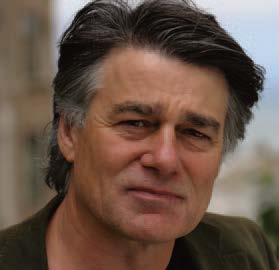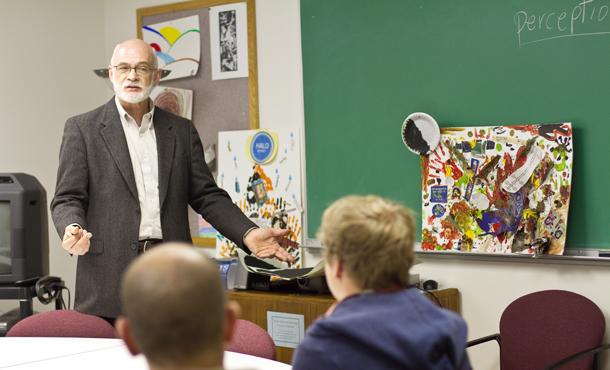Turning 20 is a life milepost worth celebrating. What’s true for an individual is equally true for Eastern Mennonite University’s MA in counseling program.
Since 1995 when the inaugural cohort of ten future counselors and therapists completed their rigorous two years of professional studies, a total of 227 graduates have earned masters degrees here. Only 62 of that number were EMU undergraduate students. The vast majority were attracted by the program’s reputation for nationally-accredited excellence, a creative community whose goal is to train the whole person (mind, body and spirit) for the challenging work of counseling.
“Being part of a small Christian university is actually a strength of our program,” said David Glanzer, PhD, and a founding faculty member. “The sense of community, the shared values of service, and the interdisciplinary opportunities to collaborate with EMU’s other graduate programs, all help to create our program’s distinctive flavor.”
These attributes and more were on full display during the hugely successful 2011 “Attachment” conference that filled EMU’s Yoder arena with more than 1200 attendees. “It took a village the size of EMU and a cooperative spirit among various academic disciplines to pull together that groundbreaking conference,” noted Annmarie Early, PhD, professor in the counseling program and one of the conference organizers.
A community of deep conversation is built into the cohort model of counselor training. A group of 12 to 20 students moves together through the two-year course of full-time study, which expands to three or four years for part-time students. Classes meet two consecutive days a week to fit the schedule of busy working adults.
“The professors were extremely knowledgeable, professional, and amazing at their work, but they also were very approachable and made time for each individual student,” reported 2004 graduate Kristene Wellings. “I wasn’t just a student. I ‘belonged’ there. This personal and emotional connection also allowed me to have the courage to develop my counselor identity. If I could sum up the experience in one word it would be ‘grace.’ Faculty members are so gracious with students. Here I learned that counseling is not just a career, it’s building relationships with real people that deserve genuine care.”
The transition from “student” to “colleague” often happens during their 600-hour internship, a major component of their second year of training. They work at a wide variety of community mental health sites. “Motivated. Hard working. Compassion for suffering. High ethical standards. Respect for clients. Ability to handle depth work with difficult cases. Solid foundation with eagerness to learn.” These are among the many positive attributes supervisors note on intern evaluations.
The ups and downs of the program’s early years are in the rear view mirror. “We’ve crossed the threshold of internal growth to sustain the program. We’ve achieved national accreditation in Community Mental Health Counseling from CACREP, seen as the gold-standard. Now we can focus more intentionally on refining our training curriculum, our practitioner-focused pedagogy,” said Early.
“Head knowledge alone is not the key to lasting change. Rather, real change comes through an immersive experience of the whole person – body, mind and spirit – in both verbal and non-verbal ways,” she explained. Exploring new ways of integrating the power of the healing and expressive arts places the counseling program at the leading edge of a burgeoning field.
As the program enters its third decade, the recently launched Institute for Experiential Therapies augments core curriculum with innovative workshops and nationally-known cutting-edge speakers. The institute’s goal is to broaden the learning horizons of its student and serve the wider network of practitioners. “I can see the institute growing into a place of retreat for professional development as we expand our regional reputation,” Haase said.

This year’s expert speaker is David Whyte, an internationally-recognized poet, author and expert in organizational development. “I have heard him several times at national conferences before audiences of several thousand. He speaks about the human condition in new ways and with great insight,” Glanzer said. “To have him on our campus for a one-day seminar in our more intimate setting will be an exciting opportunity for personal reflection and professional growth.”
Inviting a poet to speak to counselors may seem an odd choice. However, Whyte breaks the stereotypic image of poet as navel-gazer. He is as likely to quote Dante as his own lines when exploring the deeper levels of meaning embedded in life’s work, always asking the relevant questions that spark insight and change. His Yorkshire accent and global life experiences add to the power of his presentations.
Whyte will lead a seminar Feb. 22, 2014, in EMU’s Martin Chapel from 9:30 a.m. to 4 p.m. His creative workshop is on the topic of “Solace: the art of asking the beautiful question.”Attendance is limited to 300. Fees are $50 for current students and $150 for the general public. More information and registration is online.
The topic of his evening talk is “The foundation of conversational leadership.” That event will be begin 7 p.m. in EMU’s Lehman auditorium. It is free to EMU faculty, staff and students, and $20 for the general public.
Conversing about his 20-year journey and looking ahead, Glanzer sees the innovative reputation of EMU’s counseling program continuing to grow. “Each of our strong faculty have a unique vision. Invitations from the broader world to share our scholarship, pedagogy and experiential insights will open exciting doors in the years ahead.”
